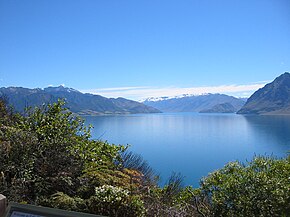
Limnology (/lɪmˈnɒlədʒi/ lim-NOL-ə-jee; from Ancient Greek λίμνη (límnē) 'lake' and -λογία (-logía) 'study of') is the study of inland aquatic ecosystems.[1] The study of limnology includes aspects of the biological, chemical, physical, and geological characteristics of fresh and saline, natural and man-made bodies of water. This includes the study of lakes, reservoirs, ponds, rivers, springs, streams, wetlands, and groundwater.[2] Water systems are often categorized as either running (lotic) or standing (lentic).[3]
Limnology includes the study of the drainage basin, movement of water through the basin and biogeochemical changes that occur en route. A more recent sub-discipline of limnology, termed landscape limnology, studies, manages, and seeks to conserve these ecosystems using a landscape perspective, by explicitly examining connections between an aquatic ecosystem and its drainage basin. Recently, the need to understand global inland waters as part of the Earth system created a sub-discipline called global limnology.[4] This approach considers processes in inland waters on a global scale, like the role of inland aquatic ecosystems in global biogeochemical cycles.[5][6][7][8][9]
Limnology is closely related to aquatic ecology and hydrobiology, which study aquatic organisms and their interactions with the abiotic (non-living) environment. While limnology has substantial overlap with freshwater-focused disciplines (e.g., freshwater biology), it also includes the study of inland salt lakes.
- ^ Kumar, Arvind (2005). Fundamentals of Limnology. APH Publishing. ISBN 9788176489195.
- ^ Wetzel, R. G. (2001). Limnology: Lake and River Ecosystems (3rd ed.). Academic Press. ISBN 0-12-744760-1.)[page needed]
- ^ Marsh, G. Alex; Fairbridge, Rhodes W. (1999). "Lentic and lotic ecosystems". Environmental Geology. Dordrecht: Springer Netherlands. pp. 381–388. doi:10.1007/1-4020-4494-1_204. ISBN 978-1-4020-4494-6. Retrieved 2022-04-21.
- ^ Downing, John A. (January 2009). "Global limnology: up-scaling aquatic services and processes to planet Earth". SIL Proceedings, 1922-2010. 30 (8): 1149–1166. Bibcode:2009SILP...30.1149D. doi:10.1080/03680770.2009.11923903. S2CID 131488888.
- ^ Cole, J. J.; Prairie, Y. T.; Caraco, N. F.; McDowell, W. H.; Tranvik, L. J.; Striegl, R. G.; Duarte, C. M.; Kortelainen, P.; Downing, J. A.; Middelburg, J. J.; Melack, J. (23 May 2007). "Plumbing the Global Carbon Cycle: Integrating Inland Waters into the Terrestrial Carbon Budget". Ecosystems. 10 (1): 172–185. Bibcode:2007Ecosy..10..172C. CiteSeerX 10.1.1.177.3527. doi:10.1007/s10021-006-9013-8. S2CID 1728636.
- ^ Tranvik, Lars J.; Downing, John A.; Cotner, James B.; Loiselle, Steven A.; Striegl, Robert G.; Ballatore, Thomas J.; Dillon, Peter; Finlay, Kerri; Fortino, Kenneth; Knoll, Lesley B.; Kortelainen, Pirkko L.; Kutser, Tiit; Larsen, Soren; Laurion, Isabelle; Leech, Dina M.; McCallister, S. Leigh; McKnight, Diane M.; Melack, John M.; Overholt, Erin; Porter, Jason A.; Prairie, Yves; Renwick, William H.; Roland, Fabio; Sherman, Bradford S.; Schindler, David W.; Sobek, Sebastian; Tremblay, Alain; Vanni, Michael J.; Verschoor, Antonie M.; von Wachenfeldt, Eddie; Weyhenmeyer, Gesa A. (November 2009). "Lakes and reservoirs as regulators of carbon cycling and climate". Limnology and Oceanography. 54 (6part2): 2298–2314. Bibcode:2009LimOc..54.2298T. doi:10.4319/lo.2009.54.6_part_2.2298. hdl:10852/11601.
- ^ Raymond, Peter A.; Hartmann, Jens; Lauerwald, Ronny; Sobek, Sebastian; McDonald, Cory; Hoover, Mark; Butman, David; Striegl, Robert; Mayorga, Emilio; Humborg, Christoph; Kortelainen, Pirkko; Dürr, Hans; Meybeck, Michel; Ciais, Philippe; Guth, Peter (21 November 2013). "Global carbon dioxide emissions from inland waters". Nature. 503 (7476): 355–359. Bibcode:2013Natur.503..355R. doi:10.1038/nature12760. PMID 24256802. S2CID 4460910.
- ^ Engel, Fabian; Farrell, Kaitlin J.; McCullough, Ian M.; Scordo, Facundo; Denfeld, Blaize A.; Dugan, Hilary A.; de Eyto, Elvira; Hanson, Paul C.; McClure, Ryan P.; Nõges, Peeter; Nõges, Tiina; Ryder, Elizabeth; Weathers, Kathleen C.; Weyhenmeyer, Gesa A. (26 March 2018). "A lake classification concept for a more accurate global estimate of the dissolved inorganic carbon export from terrestrial ecosystems to inland waters". The Science of Nature. 105 (3): 25. Bibcode:2018SciNa.105...25E. doi:10.1007/s00114-018-1547-z. PMC 5869952. PMID 29582138.
- ^ O'Reilly, Catherine M.; Sharma, Sapna; Gray, Derek K.; Hampton, Stephanie E.; Read, Jordan S.; Rowley, Rex J.; Schneider, Philipp; Lenters, John D.; McIntyre, Peter B.; Kraemer, Benjamin M.; Weyhenmeyer, Gesa A.; Straile, Dietmar; Dong, Bo; Adrian, Rita; Allan, Mathew G.; Anneville, Orlane; Arvola, Lauri; Austin, Jay; Bailey, John L.; Baron, Jill S.; Brookes, Justin D.; Eyto, Elvira de; Dokulil, Martin T.; Hamilton, David P.; Havens, Karl; Hetherington, Amy L.; Higgins, Scott N.; Hook, Simon; Izmest'eva, Lyubov R.; Joehnk, Klaus D.; Kangur, Kulli; Kasprzak, Peter; Kumagai, Michio; Kuusisto, Esko; Leshkevich, George; Livingstone, David M.; MacIntyre, Sally; May, Linda; Melack, John M.; Mueller-Navarra, Doerthe C.; Naumenko, Mikhail; Noges, Peeter; Noges, Tiina; North, Ryan P.; Plisnier, Pierre-Denis; Rigosi, Anna; Rimmer, Alon; Rogora, Michela; Rudstam, Lars G.; Rusak, James A.; Salmaso, Nico; Samal, Nihar R.; Schindler, Daniel E.; Schladow, S. Geoffrey; Schmid, Martin; Schmidt, Silke R.; Silow, Eugene; Soylu, M. Evren; Teubner, Katrin; Verburg, Piet; Voutilainen, Ari; Watkinson, Andrew; Williamson, Craig E.; Zhang, Guoqing (2015). "Rapid and highly variable warming of lake surface waters around the globe". Geophysical Research Letters. 42 (24): 10, 773–10, 781. Bibcode:2015GeoRL..4210773O. doi:10.1002/2015gl066235. hdl:10289/10465.